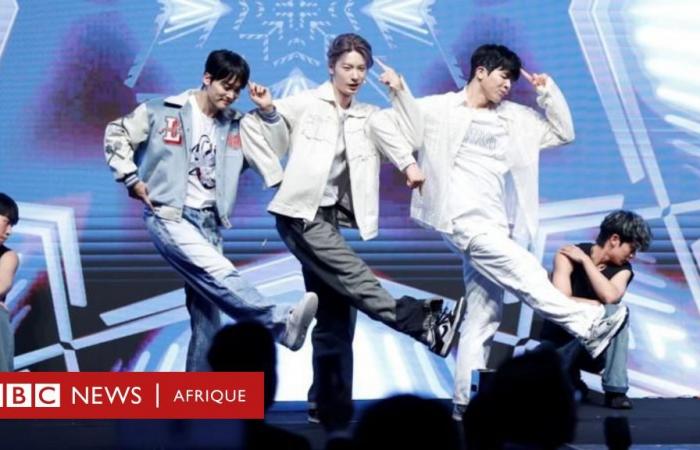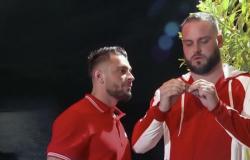Photo credit, KEAPD & Parastar Entertainment
- Author, Hyojung Kim
- Role, BBC Korean
-
16 minutes ago
On April 20, a K-pop group, Korean Pop, debuted on a music show. Usually, you expect to hear the joyful screams and chants of fans echoing across the stage. The group’s perfectly choreographed dance moves under the dazzling lights were breathtaking, but the audience remained unexpectedly silent.
For the band, the fans’ silence wasn’t discouraging. On the contrary, it was rather touching for the artists.
This is what happened to South Korea’s first hearing-impaired K-pop group, Big Ocean, a month after their debut.
Big Ocean is made up of three members, Hyunjin, Jiseok, and Chanyeon, all of whom are hearing impaired. They use cochlear implants and hearing aids to hear sounds and communicate by reading lips.
Fans refrained from shouting to ensure that Big Ocean members wouldn’t miss the backing track amid the noise.
Big Ocean performs without in-ear headphones, which are commonly used by artists to check melody and rhythm.
“Usually there is a lot of applause during concerts. But the audience was quieter than expected. Since it is difficult for us to hear and keep up the rhythm, the fans helped us by waving their phones in syncing with the beat,” Hyunjin explains.
The Big Ocean adventure began about two years ago. ParaStar Entertainment, an agency specializing in representing actors and models with disabilities, has launched a K-pop idol project.
The goal was to present music that transcends language barriers and physical limitations through K-pop.
Hyunjin, initially a YouTuber who worked on hearing disability awareness, was the first to join the group.
He was followed by Jiseok, a former Paralympic alpine skier, and Chanyeon, an audiologist at a university hospital, who joined the group following auditions and castings.
The rigorous training process well known in the idol industry proved even more difficult for the hearing impaired.
After a year and a half of training, there were only three left.
Vibrations and light
For Big Ocean, the mastery of dance, song and rap is akin to the search for tenuous sounds immersed in the depths of the ocean.
The sounds, often muffled or distorted, made coordinating their movements a formidable challenge.
“When it comes to rhythm, each of us hears it differently,” Chanyeon explains. “I may react at that moment, while other members may react a little before or after. It was difficult to fill these gaps.”
“I learned to feel the vibrations and sounds of a metronome with my body to perfectly synchronize with the beat,” adds Jiseok, known for his rapping.
He is determined to combat stereotypes and the misconception that “people with hearing impairments have speech difficulties…”
To maintain precise timing in their choreography, they used metronomes that display lights and smartwatches, which communicate rhythm through vibrations.
Although it was difficult to find the right tone, they used artificial intelligence technology that had been trained with the members’ voice data. However, the three members performed the vocal parts themselves.
Thanks to these innovations, Big Ocean’s first track, “Glow” (a cover of the 1998 hit “Hope” by first-generation K-pop boy band HOT), made an impact.
This title also introduced a new linguistic element. Sign language was incorporated into the lyrics, enhancing the choreography and establishing a unique musical genre for Big Ocean.
Photo credit, Parastar Entertainment
Their journey to beginning also exposed them to significant skepticism and prejudice.
They were faced with questions loaded with stereotypes: “Can the hearing impaired sing?”, “Can they perform live?” or “do you need to know sign language to attend their fan meetings?”
They were even accused of exploiting their condition.
“We were very worried about being ridiculed for trying to be idols when we can’t hear,” Hyunjin says.
But less than a month after their debut, Big Ocean’s YouTube channel surpassed 100,000 subscribers, and some videos have been viewed more than a million times.
Their innovative efforts led Dr. Tedros Adhanom Ghebreyesus, Director-General of the World Health Organization, to congratulate them on social media. He recognized their merit in breaking down the stigmas and barriers associated with disabilities.
Fans told the BBC they saw real hope in Big Ocean.
Jade, a hearing-impaired Australian, said: “It gave me a lot of hope. I saw that they were going to debut, and that gave me hope and more confidence to be able to realize my dreams.”
“I was thrilled that sign language was incorporated. It excited me because sign language is such an important part of our community that to show it in such a beautiful way was just phenomenal,” Jade added.
Cho Young-kook, a fan who attended the group’s show to support them, was impressed by their performance.
“What is most impressive is that they were able to deliver an impeccable performance despite their hearing impairment. I hope Big Ocean spreads across the world like the waves of the sea,” he says .
The K-pop market is “perfectionist”
Photo credit, Parastar Entertainment
While there is excitement over Big Ocean’s emergence on the K-pop scene, some believe their success in the market “has its limits.”
South Korea’s competitive and dynamic K-pop market demands not only good looks and dancing skills, but also exceptional vocal abilities and performing skills, which requires idols to be versatile and highly qualified.
Every year, hundreds of idol groups debut, but only a few manage to survive. For disabled idols, especially those with hearing impairments, the challenges are considerable.
K-pop experts welcome the diversity these artists bring, but they also note the need for a “clear survival strategy.”
“The arrival of disabled artists and the unique divide they create in the K-pop market is an important societal event,” Park Hee-ah, a journalist and South Korean pop critic, told the BBC .
She added: “While it’s true that performing live is difficult, these difficulties may not be insurmountable if artists can showcase other unique elements of their team on stage.”
Lee Gyu-tag, a professor of cultural studies at Korea’s George Mason University, also praised the group’s debut.
“Its members seem to offer a warm and human side, which moves away from the often rigid, cold or mechanical image of traditional K-pop. Although K-pop is also about performance and appearance, in Ultimately, if the music is not good, success is unattainable,” Mr. Lee added.
“Depending on the type of music they present, this group could potentially enrich the K-pop scene in new ways.”
“We want to share a whole new type of music”
The members of Big Ocean hope that their songs will resonate deeply with listeners.
Hyunjin says they offer a unique approach to music.
“We want to bring you music that is unlike anything you have ever heard. Our hearing impairments allow us to perceive sounds differently, and I have developed my own way of understanding the ‘world of sound’. We are “can’t wait to share this fresh, new music with everyone,” he explains enthusiastically.
Haley Cha, CEO of ParaStar Entertainment, which manages Big Ocean, acknowledges that the group faces significant challenges, perhaps more so than many other artists.
“The depth and authenticity of comfort offered by Big Ocean might just be what sets them apart. Their experiences not only shape their music, they also infuse it with a real sincerity that resonates deeper with listeners,” explains- she said.






